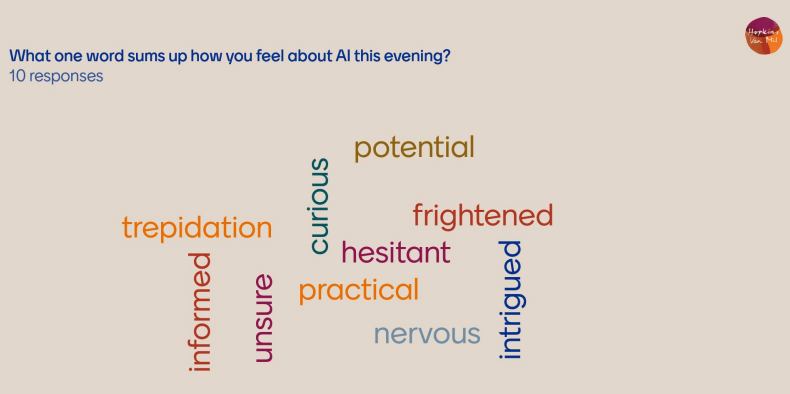People's Panel on AI Bulletin 1
On Wednesday, the 12 members of the People’s Panel on AI met on Zoom for the first time, in a two-hour introduction and context-setting session. Next week they’ll spend four days in London engaging with the AI Fringe, to engage with experts, and follow updates from the AI Safety Summit.
Earlier, we held a briefing session to provide more background about the panel. You can find the recording here.
From Tuesday -> Friday next week we aim to share a daily bulletin with you - providing insights, updates and questions coming from panel deliberations.
Introducing the panel
We worked with Sortition Foundation who sent out information about the Panel to an opt-in list of potential participants. Over 490 people expressed an interest, from which Sortition Foundation created a random stratified sample of 12 panellists.
The panel has an even gender split, participants aged between 22 and 70, ethnic diversity broadly matching the UK population, and members from across England, including rural and urban areas. The panel selection was also stratified by past experience of AI: from those who feel confident explaining what it is and how it works, to those completely new to thinking about artificial intelligence.
In our introductory Zoom call participants talked more about their existing experiences: some have used specific AI tools or platforms - from using AI at work, planning holidays with ChatGPT, using AI-based photo-fill tools and using smart assistants. Other panel members referenced AI in the media, and the role of AI in healthcare. Some have not used AI tools at all.
Over next week, panellists will have the chance to learn about different aspects of AI and issues in AI governance in a variety of ways. They will explore how far the ideas, policies and practices being put forward at the Summit and Fringe fit with the opportunities and risks they are most concerned about.
Insights and issues
One of our hopes for the People’s Panel is that it can help to anchor discussions over the next week in public concerns. We asked the panel about the AI issues they are already thinking about:
- AI in Healthcare. Many of the positive examples of AI discussed were from healthcare.
- Social media concerns. How are algorithms shaping what we see? How is this, or should it be, regulated?
- Democracy and information integrity. Does AI make it easier to manipulate information?
- Reliance on AI. Is AI just a tool? What happens when we become reliant on it everyday?
- AI Safety. How safe is AI? Can it get into the wrong hands?
- Employment. Will AI affect work, employment, who is employed?
- Unsure until I find out more. Participants were looking forward to gathering more information over the week.

Till next week
If you’d like to be kept up to date with the People’s Panel on AI, join as an observer, volunteer as an expert witness, or join the panel’s presentation on Friday 3rd November, please register your interest here.
- If you express an interest in being an observer, we will aim to be in touch by the end of Monday;
- If you express an interest in joining the in-person panel presentation on Friday, we will confirm your place by Wednesday.
About the People’s Panel
The People’s Panel on AI brings together 12 representative members of the public randomly selected by the Sortition Foundation to attend, observe and discuss key events at the AI Fringe, which is being held alongside the UK Government’s AI Safety Summit at the beginning of November 2023.
Through a deliberative process facilitated by Hopkins Van Mil, the panel is working towards a public report giving their verdict on AI and their recommendations to government, industry, civil society and academia for further action.
The People’s Panel on AI is being organised by Connected by Data with support from the Mozilla Foundation, the Accelerate Programme for Scientific Discovery, the Kavli Centre for Ethics, Science, and the Public, and the Ada Lovelace Institute.
